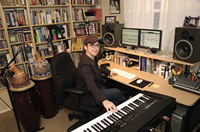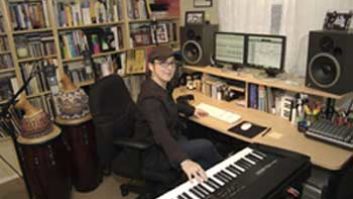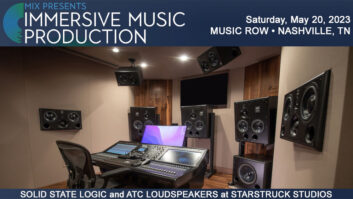
Rebeca Mauleón’s personal studio doubles as a home office. She also shares the space with her husband and sons.
Photo: Manolo Santana
For 20 years, San Francisco-based musician/composer/educator Rebeca Mauleón (www.rebecamauleon.com) has relied on a modestly equipped and “cozy” but highly versatile home studio for composing, arranging and teaching private piano students. Dubbed Forest Hill Studios, it also accommodates live tracking and overdubbing for Mauleón’s increasingly diverse projects, which now encompass scoring, composing and recording for TV, film, videogames and music software.
An established artist, bandleader, author and independent contractor, Mauleón divides her time between numerous jobs and family. “The music business is characteristically unstable — feast or famine, for the most part,” she observes. “I tend to relish multitasking. My compositional work is special because it keeps me home, and I know my kids like it that way.”
Mauleón first emerged in the late 1970s as a pianist working mainly in Latin, jazz and world music styles. At the same time, she was studying composition at Mills College (Oakland, Calif.), where she was introduced to music technology. “I was interested in using sequencing software to flesh out my ideas, and I wanted to learn notation software so I could create charts that looked more polished,” she recalls.
Mauleón continued to refine her arranging and production skills, working with artists and producers, including Mickey Hart, Tito Puente, Steve Winwood and Narada Michael Walden. In ’97, she self-produced the first of three solo albums, Round Trip, singing, arranging and playing keyboards and percussion. Drawing on her session experiences, she expanded the scope of her project work at home.
“I’m in a downstairs office space with little more than 100 square feet,” she says. “The only acoustical treatment we did was to add some insulation and ceiling tiles, as well as a dual-paned window. Fortunately, the studio faces toward the yard and there is almost no noise on our street. Only occasionally do I need to stop for an airplane or truck, so it’s quite idyllic sound-wise.
“My setup is based around the production desk with built-in racks and my Roland RD-600 MIDI keyboard — which I also use for gigs, so it moves in and out,” she says. Mauleón works on a Pro Tools LE system (Version 7.4) using a dual 1.8GHz Mac G5 PowerPC and a Digi 002 Rack, along with a MOTU MIDI Express XT. Outboard gear includes a TC Electronic M2000, Lexicon MX200, Avalon 737 mic pre and dbx 231 dual-channel 31-band graphic EQ. Other instruments include Roland JV-1010 and JV-1080 synth modules; soft synths from Native Instruments, IK Multimedia and Yellow Tools; and sample libraries and loop collections.
Mauleón’s mic collection comprises pairs of Shure SM57s and SM58s; a pair of AKG C-414s; a Sennheiser 421; and a RØDE NT1-A. “When I need to mike something for live tracking — such as percussion, horns or vocals — we tend to move things around in the room as needed,” she notes. She uses Event Electronics Project Studio 8 speakers and on different systems, including her car stereo.
Mauleón has composed for Electronic Arts’ Sims 2 and 3 games, and produced and recorded Santana percussionist Karl Perazzo for PG Music’s Real Drums software. She also scored the MSNBC documentary Crossing the Line. “With documentary and film composition, the task lies in being able to support the visual image without being too noticeable,” she says. “It forces my music to remain invisible while enhancing the emotive quality of the scene. I tell my composition students, the music is doing its job when you don’t notice it!”



